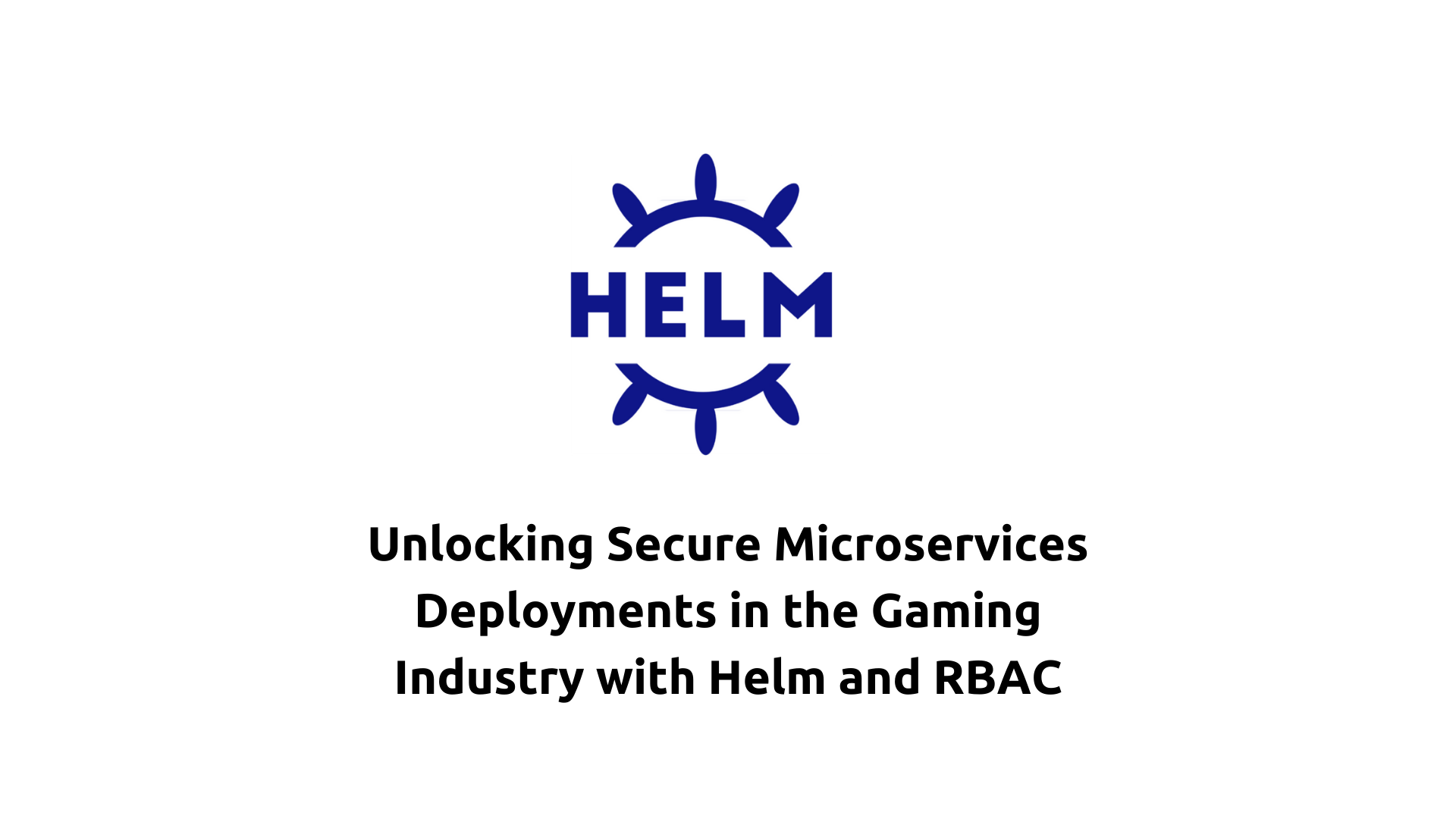Unlocking Secure Microservices Deployments in the Gaming Industry with Helm and RBAC
 Saurabh Adhau
Saurabh Adhau
Introduction
The gaming industry is witnessing a seismic shift towards microservices architectures to power highly scalable and immersive gaming experiences. With this evolution comes the challenge of managing and securing these complex distributed systems. Helm, a powerful package manager for Kubernetes, offers a solution for deploying and managing microservices. When combined with Role-Based Access Control (RBAC), Helm empowers gaming companies to ensure secure deployments and protect sensitive data. In this article, we'll explore RBAC in Helm, delve into the use cases within the gaming industry, and discuss its benefits in detail.
Understanding RBAC in Helm
Role-Based Access Control (RBAC) is a Kubernetes feature that regulates access to Kubernetes resources based on roles and role bindings. RBAC defines what actions are permitted within a Kubernetes cluster and who can perform those actions. Helm leverages RBAC to ensure that only authorized users have access to Helm operations and resources.
RBAC Configuration in Helm
RBAC configuration in Helm involves defining roles and role bindings within Kubernetes manifests. Helm users can define RBAC rules in their Helm charts to control access to Helm operations such as installing, upgrading, and deleting releases.
Example: Secure Microservices Deployment in the Gaming Industry
Let's consider an example scenario in the gaming industry where a company is deploying microservices for a multiplayer online game. The microservices include components for user authentication, matchmaking, game logic, and telemetry analysis. To ensure secure deployments, RBAC is implemented using Helm:
RBAC Configuration
In the Helm chart for deploying the microservices, RBAC rules are defined to restrict access to sensitive resources. Roles are created for different user roles such as administrators, developers, and operators. Role bindings are then defined to associate these roles with specific users or groups.
Admin Role: Grants full access to all Helm operations and resources within the cluster.
Developer Role: Allows performing Helm operations related to deploying and managing microservices but restricts access to sensitive resources like secrets.
Operator Role: Provides read-only access to Helm operations for monitoring and auditing purposes.
# admin-role.yaml
apiVersion: rbac.authorization.k8s.io/v1
kind: ClusterRole
metadata:
name: admin-role
rules:
- apiGroups: ["*"]
resources: ["*"]
verbs: ["*"]
# developer-role.yaml
apiVersion: rbac.authorization.k8s.io/v1
kind: ClusterRole
metadata:
name: developer-role
rules:
- apiGroups: [""]
resources: ["pods", "services", "deployments"]
verbs: ["get", "list", "create", "update", "delete"]
# admin-role-binding.yaml
apiVersion: rbac.authorization.k8s.io/v1
kind: ClusterRoleBinding
metadata:
name: admin-role-binding
roleRef:
kind: ClusterRole
name: admin-role
apiGroup: rbac.authorization.k8s.io
subjects:
- kind: User
name: admin-user
apiGroup: rbac.authorization.k8s.io
# developer-role-binding.yaml
apiVersion: rbac.authorization.k8s.io/v1
kind: ClusterRoleBinding
metadata:
name: developer-role-binding
roleRef:
kind: ClusterRole
name: developer-role
apiGroup: rbac.authorization.k8s.io
subjects:
- kind: User
name: developer-user
apiGroup: rbac.authorization.k8s.io
Benefits of RBAC in Helm for the Gaming Industry
Enhanced Security: RBAC ensures that only authorized users have access to Helm operations and resources, minimizing the risk of unauthorized access or data breaches.
Granular Access Control: RBAC enables fine-grained control over user permissions, allowing gaming companies to enforce least privilege principles and limit access to sensitive resources.
Compliance: RBAC helps gaming companies meet regulatory compliance requirements by implementing access controls and audit trails for Helm operations.
Collaboration: RBAC facilitates collaboration among development, operations, and security teams by providing role-based access to Helm deployments and resources.
Conclusion
Role-Based Access Control (RBAC) in Helm plays a pivotal role in ensuring secure microservices deployments in the gaming industry. By leveraging RBAC, gaming companies can enforce access controls, protect sensitive data, and foster collaboration among teams. As the gaming industry continues to embrace microservices architectures for building scalable and immersive gaming experiences, RBAC in Helm will remain a critical component for achieving secure and compliant deployments.
Subscribe to my newsletter
Read articles from Saurabh Adhau directly inside your inbox. Subscribe to the newsletter, and don't miss out.
Written by

Saurabh Adhau
Saurabh Adhau
As a DevOps Engineer, I thrive in the cloud and command a vast arsenal of tools and technologies: ☁️ AWS and Azure Cloud: Where the sky is the limit, I ensure applications soar. 🔨 DevOps Toolbelt: Git, GitHub, GitLab – I master them all for smooth development workflows. 🧱 Infrastructure as Code: Terraform and Ansible sculpt infrastructure like a masterpiece. 🐳 Containerization: With Docker, I package applications for effortless deployment. 🚀 Orchestration: Kubernetes conducts my application symphonies. 🌐 Web Servers: Nginx and Apache, my trusted gatekeepers of the web.